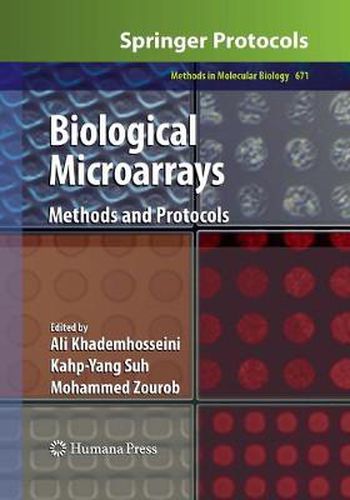Readings Newsletter
Become a Readings Member to make your shopping experience even easier.
Sign in or sign up for free!
You’re not far away from qualifying for FREE standard shipping within Australia
You’ve qualified for FREE standard shipping within Australia
The cart is loading…






This title is printed to order. This book may have been self-published. If so, we cannot guarantee the quality of the content. In the main most books will have gone through the editing process however some may not. We therefore suggest that you be aware of this before ordering this book. If in doubt check either the author or publisher’s details as we are unable to accept any returns unless they are faulty. Please contact us if you have any questions.
Recent developments in microarray technology have changed the landscape of biology and biomedical research, and they have revolutionized RNA and DNA research. In Biological Microarrays: Methods and Protocols, expert researchers explore exciting new developments in the field, providing a comprehensive approach to biological microarrays that conveys not only the state-of-the-art fundamentals, but also includes applications of the most innovative methods. Chapters address both the application of biological microarrays, including DNA/RNA, apatmer, proteins, tissues, oligonucleotides, carbohydrates, biomaterials, cells, bacteria, and virus microarrays, and also explore the different techniques used for generating microarray platforms. Composed in the highly successful Methods in Molecular Biology ™ series format, each chapter contains a brief introduction, step-by-step methods, a list of necessary materials, and a Notes section which shares tips on troubleshooting and avoiding known pitfalls.
Wide-ranging and revolutionary, Biological Microarrays: Methods and Protocols serves as a primary source for academics, practitioners, and professionals in related fields, including biologists, biotechnologists, biochemists, analytical chemists, and biomedical, physical, and microsystems engineers, to name a few, appealing to all of those interested in the present and future state of biological microarray research.
$9.00 standard shipping within Australia
FREE standard shipping within Australia for orders over $100.00
Express & International shipping calculated at checkout
This title is printed to order. This book may have been self-published. If so, we cannot guarantee the quality of the content. In the main most books will have gone through the editing process however some may not. We therefore suggest that you be aware of this before ordering this book. If in doubt check either the author or publisher’s details as we are unable to accept any returns unless they are faulty. Please contact us if you have any questions.
Recent developments in microarray technology have changed the landscape of biology and biomedical research, and they have revolutionized RNA and DNA research. In Biological Microarrays: Methods and Protocols, expert researchers explore exciting new developments in the field, providing a comprehensive approach to biological microarrays that conveys not only the state-of-the-art fundamentals, but also includes applications of the most innovative methods. Chapters address both the application of biological microarrays, including DNA/RNA, apatmer, proteins, tissues, oligonucleotides, carbohydrates, biomaterials, cells, bacteria, and virus microarrays, and also explore the different techniques used for generating microarray platforms. Composed in the highly successful Methods in Molecular Biology ™ series format, each chapter contains a brief introduction, step-by-step methods, a list of necessary materials, and a Notes section which shares tips on troubleshooting and avoiding known pitfalls.
Wide-ranging and revolutionary, Biological Microarrays: Methods and Protocols serves as a primary source for academics, practitioners, and professionals in related fields, including biologists, biotechnologists, biochemists, analytical chemists, and biomedical, physical, and microsystems engineers, to name a few, appealing to all of those interested in the present and future state of biological microarray research.